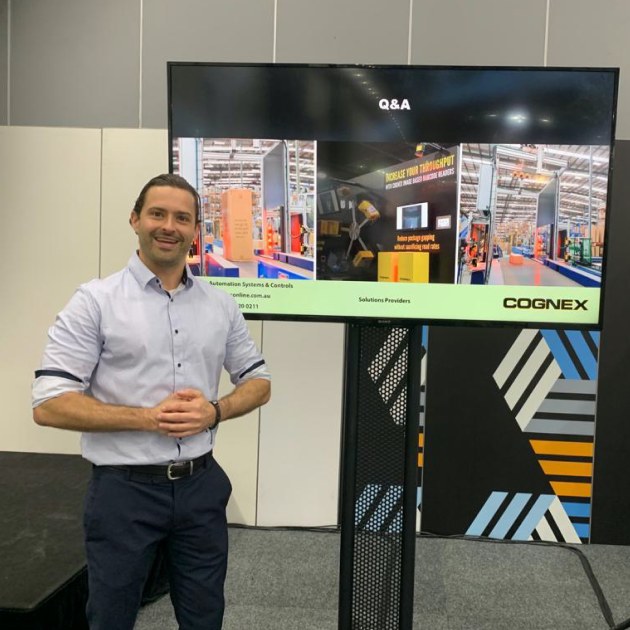Boosting Australia’s competitiveness and reshoring manufacturing has become a hot topic of conversation for government and local manufacturers in recent years, and these discussions have placed increasing focus on automation. Automation Systems & Controls (ASC) weighs in on the topic ahead of the Modern Manufacturing Expo.
This is due to automation offering businesses across industries the ability to cut costs, while also increasing production.
“Manufacturers have a lot of flexibility in the level of automation they choose to implement, as it can range from automating a single operation on the factory floor to end-to-end automation of entire production chains with no human involvement,” said Ryan Hart, manager – deep learning and machine vision solutions at Automation Systems & Controls (ASC).
“Factory automation can also be implemented at any point in the manufacturing process, making this an agile and surprisingly cost-effective solution.”
ASC is looking forward to sharing these automation insights with a wider audience when they exhibit at the Modern Manufacturing Expo, which takes place on 20-21 September 2022 at the Sydney Showgrounds.
Visitors to the ASC stand (L12) will experience a range of factory automation solutions, including Cognex Machine Vision, Mitsubishi Electric PLCs VSDs and HMIs, TPL Industrial Machine Lightning, Ewon remote communication hubs, Advantech Industrial PLCs and Screens and Autonics Control Panel hardware.
“The synergy between our team and the Modern Manufacturing Expo is, firstly, a passion for providing the most efficient solutions available, and secondly, a passion for staying on the cutting edge of technological advancement,” Hart said.
“This combination ensures that ASC’s valued customers continue to produce at a world-class standard.”
ASC draws on 125 years of experience in the electrical, mechanical, engineering, machine vision and control product specialist fields to deliver world-class factory automation solutions to customers looking to upgrade.
The company also believes that they have a larger responsibility, much like the Modern Manufacturing Expo, to use their considerable resources and knowledge to advance manufacturing in Australia.
This cannot happen without collaboration with other manufacturing stakeholders, and ASC encourages think-tank philosophies within their automation projects, as different skill sets share their knowledge via group problem-solving sessions.

Goal may be automation, but human element enables success
“We view our relationship with the customer as a partnership, and it is imperative that we listen to them and learn of their unique challenges before offering solutions-based packages,” said Hart.
He explained that this exploration phase is an essential first step in factory automation because ASC will often encounter customers who have cobbled-together various smart devices as an attempt to put a band-aid on ongoing production problems.
Offering automation solutions without understanding the full scope of the problem is a short-term fix.
“It’s our job to understand each aspect of the job ahead by talking to those who have the greatest insights before we can begin to offer solutions,” he added.
“Factory automation may be technologically based, but the human element should not be underestimated.”
Results through trial and error
Because factory automation involves so many elements, the goal posts can easily change, requiring agile operatives. This means that the early stages of an ASC project often involve multiple tests to try and identify which production hurdles may limit factory automation success.
Hart listed the following scenarios where small process deviations could derail automation:
- Factory lighting may not be optimal for machine vision equipment to perform its deemed task. The lighting may change over the course of the day, creating a variance in performance;
- Printing on packaging may vary between print batches;
- Print may vary between product types;
- Print quality may change due to temperature variants; and
- Product colours may span a wide palette – from dark to light shades.
These variants, along with many others, are often too slight for the naked eye to notice. It isn’t until trained professionals run tests that production anomalies come to the fore, and solutions can be customised from there.
“We pride ourselves on working from factual content – we’d rather let the data tell us what needs to be tweaked for automation success, than work off our own assumptions,” Hart said.
Trust and confidence needed for project success
Hart believes that world-class factory automation is a multi-dimensional process, and that trust and confidence play a significant role.
“First, the customer must feel confident about trusting the deployed team. Then, the deployed ASC team leader must have the confidence in their ability to make project-positive decisions – this is crucial, because it is common for on-site challenges to crop up,” he continued.
Indecision and inexperience can result in lost time, lost production, and worst of all, a loss of trust in the supplier from the customer.
End-to-end factory automation can often be a daunting process, and requires significant changes and expenditure from the customer, so they must have complete trust in the supplier’s ability to deliver on the intended project outcomes.
In it for the long-term
To ensure that trust is maintained and expectations are met, ASC conducts pre, mid and post-project meetings, which include all parties for transparency.
“What makes us different is that we’re in it for the long-term. We want customers to have the confidence to suggest changes, so that we can deliver a solution that fully caters to their needs. It’s all part of the continual improvement process,” Hart explained.
“It is the ability of the trained skilled staff at ASC to listen to challenges, analyse results, continually train staff, perform health checks, and confidently deploy turnkey solutions that embody the true essence of world-class factory automation.”






